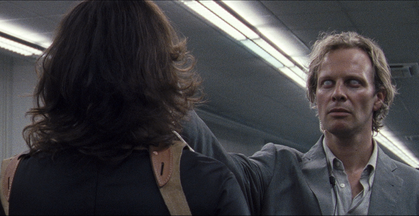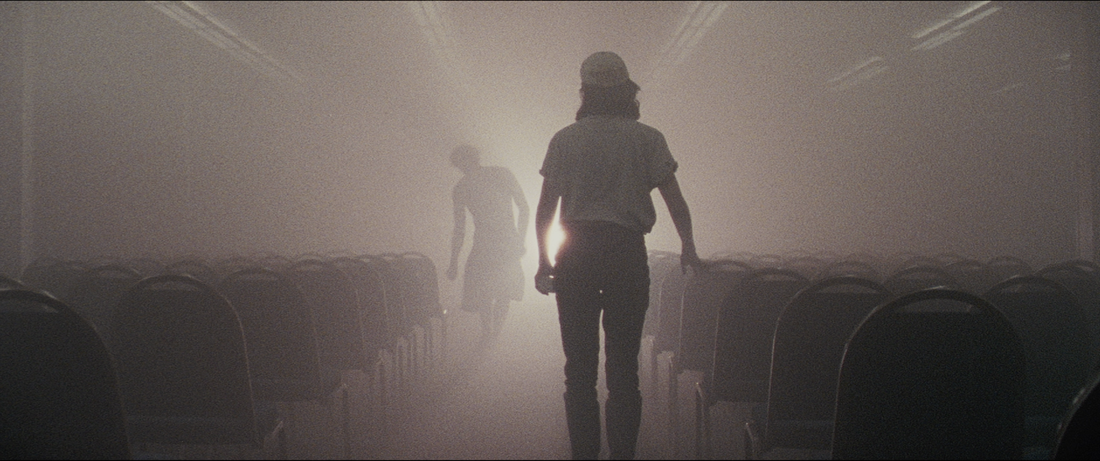 “Is this seriously how you want to live your life?” I’ve been thinking about this opening line from Luz for days now, both in reference to the film, my own life, and the society around me. I mention it because that one line perfectly encapsulates both the confusing, contemplative nature of the film, and its reference to the power of language… …Unleashed as the feature debut of writer/director Tilman Singer, Luz follows the title character, Luz (Luana Velis), a cabdriver who stumbles into a police station without much recollection of what has happened to her. Turns out though, she’s being followed by a demonic entity determined to get its hands on her. There is a new name on the horror scene, and his name is Tilman Singer. Consider me impressed that this is Singer’s debut film. Like any first feature, Luz has its flaws, and we’ll get to those, but man oh man does Singer flex his filmmaking muscles with this one. Luz is a highly complex, highly atmospheric film that reminds me of films like Pontypool or The Ugly with a sprinkling of Lucio Fulci. Like both of those films, Luz is told in a contained space, mostly located in a single, brightly lit room, with a menace that is attempting to creep into minds of others through the power of language. Luz opens with a long, patient take in which Luz stumbles into a police station, buys a snack from the vending machine, and then finally says the line I mentioned above to the receptionist. This line and others are a mantra that is repeated all throughout the film, and the demon itself is a master manipulator with words. On the surface, all of it seems inconsequential and even silly-my favorite being the line, “thy will be done, in the crotch of an old grandpa”-but as time goes on, we as the audience begin to understand more about these words, and the dangerous effect they have. This isn’t your average film where a demon goes from person to person in the name of slaughter and blood, such as Fallen. This film’s demon is a body hopper, but Luz is completely unique, and it’s something you can sense right away. Some of that has to do with Singer’s masterful craftsmanship. That same opening scene in the station also establishes a consistent aesthetic present in nearly every scene, in which we are given a wide shot of an otherwise dull space, lit with fluorescent lights giving off a heavenly glow, as if to emphasize heaven hanging just above this nightmare playing out underneath the lights. Most of that story takes place in an awfully plain though claustrophobic interrogation room that Singer somehow manages to make visually interesting. Here we meet detectives Olarte (Johannes Benecke) and Bertillon (Nadja Stubiger), as well as psychiatrist Dr. Rossini (Jan Bluthardt). Over the course of Luz’s snappy, hour long runtime, Rossini lulls Luz into a hypnosis in order to bring her back to the scene of an accident and find out what happened. Reality and memory blend, splicing the two together during what is essentially one long, fascinating scene. The effect is hypnotic, with compelling performances from the cast, especially Luz and Rossini, who are saying more with their body movements than their actual words. Luz is a strange, frightening mystery, and just when you think it can’t get any stranger, the film takes a step further into weird. One of these people is the demon in disguise, and we know who it is. Using this knowledge, Singer shows off his ability to achieve maximum suspense with limited resources. Through cinematographer Paul Faltz’s methodical camera movements which creep around the room, the beautiful framing, performances, and a (sometimes overpowering) mood setting retro-soundtrack from Simon Waskow, Singer consistently ratchets up the tension in the tight setting of Luz. This film is relatively simple on the surface and probably wouldn’t work in the hands of a lesser director, but there’s so much working to enhance the environment and suspense, that Luz is a devilishly eerie watch. Wrapped up in demons and implications of heaven and hell with a pinpoint focus on the use of hypnotism, Luz itself hypnotizes the viewer with a surrealist approach. I wasn’t exaggerating when I said this film has a Luci influence. This film gets weirder and weirder as it goes, culminating in a point where the main setting fills with fog so thick, every sound and shadow will have you clawing the arms of your seat. Like some dreams, Luz is one that starts off as odd but calm, gradually transforming into a nightmarish confrontation in the third act that had my heart practically drumming in my ears. This is complex surrealism at its best, and will no doubt satisfy horror fans who prefer eerie slow burns over excessive jump scares and bloodshed. Like with any first feature though, Luz isn’t perfect, as masterfully crafted as it is. For one, Luz is a serious film, yet it’s difficult to consistently hear lines like “thy will be done, in the crotch of an old grandpa,” without snickering. I’m immature, what do you want from me? But more than that, Luz keeps its audience in the dark for far too long, without anything truly revelatory coming out of it. Just like the characters are towards the end, I found myself lost in the fog of the situation. Singer keeps Luz’s story and the intentions of the demon vague, which would be fine if we were working towards something shocking, but that shock never comes. What we’re left with ultimately is an answer which doesn’t have the impact it should, and which undercuts the beautifully laid out mystery. Still, Luz is a strange, suspenseful ride through a hellish dreamscape that left me wanting more. This film isn’t for everyone, but there is no debating that Luz is a truly unique debut, and I eagerly await seeing what Singer does next. Luz is now playing in select cinemas through Screen Media. Check listings here. By Matt Konopka
0 Comments
Leave a Reply. |
Archives
March 2023
|


 RSS Feed
RSS Feed